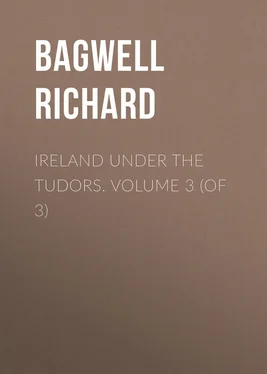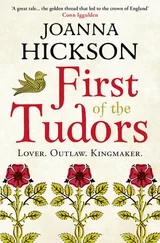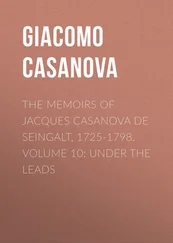Richard Bagwell - Ireland under the Tudors. Volume 3 (of 3)
Здесь есть возможность читать онлайн «Richard Bagwell - Ireland under the Tudors. Volume 3 (of 3)» — ознакомительный отрывок электронной книги совершенно бесплатно, а после прочтения отрывка купить полную версию. В некоторых случаях можно слушать аудио, скачать через торрент в формате fb2 и присутствует краткое содержание. Жанр: foreign_antique, foreign_prose, на английском языке. Описание произведения, (предисловие) а так же отзывы посетителей доступны на портале библиотеки ЛибКат.
- Название:Ireland under the Tudors. Volume 3 (of 3)
- Автор:
- Жанр:
- Год:неизвестен
- ISBN:нет данных
- Рейтинг книги:3 / 5. Голосов: 1
-
Избранное:Добавить в избранное
- Отзывы:
-
Ваша оценка:
- 60
- 1
- 2
- 3
- 4
- 5
Ireland under the Tudors. Volume 3 (of 3): краткое содержание, описание и аннотация
Предлагаем к чтению аннотацию, описание, краткое содержание или предисловие (зависит от того, что написал сам автор книги «Ireland under the Tudors. Volume 3 (of 3)»). Если вы не нашли необходимую информацию о книге — напишите в комментариях, мы постараемся отыскать её.
Ireland under the Tudors. Volume 3 (of 3) — читать онлайн ознакомительный отрывок
Ниже представлен текст книги, разбитый по страницам. Система сохранения места последней прочитанной страницы, позволяет с удобством читать онлайн бесплатно книгу «Ireland under the Tudors. Volume 3 (of 3)», без необходимости каждый раз заново искать на чём Вы остановились. Поставьте закладку, и сможете в любой момент перейти на страницу, на которой закончили чтение.
Интервал:
Закладка:
2 2 Stukeley to Mistress Julian (from Rome) October 24, 1575, in Wright’s Elizabeth , Motley’s Dutch Republic , part v. ch. v.; Strype’s Annals , Eliz. book ii. ch. viii.; Wilson to Burghley and Walsingham, February 19, 1577, and to the Queen, May 1, both in the Calendar of S. P. Foreign ; Henry Cheek to Burghley, March 29, 1577; Strype’s Life of Sir John Cheek . Stukeley left Don John at the end of February, 1577.
James Fitzmaurice was already at Rome. He had spent the best part of two years in France, where he was well entertained, but where he found no real help. He received supplies of money occasionally. The Parisians daily addressed him as King of Ireland, but nothing was done towards the realisation of the title. Sir William Drury’s secret agent was in communication with one of Fitzmaurice’s most trusted companions, and his hopes and fears were well known in Ireland. At one time he was sure of 1,200 Frenchmen, at another he was likely to get 4,000; and De la Roche, who was no stranger in Munster, was to have at least six tall ships for transport. De la Roche did nothing but convey the exile’s eldest son, Maurice, to Portugal, where he entered the University of Coimbra. Sir Amyas Paulet had instructions to remonstrate with the French Court, and the old Puritan seems to have been quite a match for Catherine de Medici; but there was little sincerity on either side. The Queen-mother’s confidential agent confessed that all was in disorder, and that the French harbours were full of pirates and thieves, but she herself told Paulet that De la Roche had strict orders to attempt nothing against England. Having little hope of France, Fitzmaurice himself went to Spain, where his reception was equally barren of result. The Catholic King was perhaps offended at the Most Christian King having been first applied to, and at all events he was not yet anxious to break openly with his sister-in-law. 3 3 Intelligence received by Drury, February 19, 1577, and April 16; Examination of Edmund MacGawran and others May 10; Paulet to Wilson, August, 1577, in Murdin’s State Papers .
But at Rome, Fitzmaurice was received by Gregory with open arms. He was on very friendly terms with Everard Mercurian, the aged general of the Jesuits, who was, however, personally opposed to sending members of the order to England, Ireland, or Scotland; a point on which he was soon overruled by younger men. What the life of a Jesuit missionary was may be gathered from a letter written to the General about this time.
‘Once,’ wrote Edmund Tanner from Rosscarbery, ‘was I captured by the heretics and liberated by God’s grace, and the industry of pious people; twelve times did I escape the snares of the impious, who would have caught me again had God permitted them.’
But the harvest, though hard to reap, was not inconsiderable. Tanner reported that nobles and townsmen were daily received into the bosom of Holy Church out of the ‘sink of schism,’ and that the conversion would have been much more numerous but that many feared present persecution, and the loss of life, property, or liberty.
This chain still kept back a well-affected multitude, but the links were worn, and there was good hope that it soon would break. 4 4 Edmundus Tanner Patri Generali Everardo, October 11, 1577, in Hogan’s Hibernia Ignatiana .
We know from an original paper which fell into the hands of the English Government, what were Fitzmaurice’s modes and requirements for the conquest of Ireland. Six thousand armed soldiers and their pay for six months, ten good Spanish or Italian officers, six heavy and fifteen light guns, 3,000 stand of arms with powder and lead, three ships of 400, 50, and 30 tons respectively, three boats for crossing rivers, and a nuncio with twenty well-instructed priests – such were the instruments proposed. He required licence to take English ships outside Spanish ports, and to sell prizes in Spain. Property taken from Geraldines was to remain in the family, and every Geraldine doing good service was to be confirmed by his Holiness and his Catholic Majesty in land and title. Finally, 6,000 troops were to be sent to him in six months, should he make a successful descent.
As sanguine, or as desperate, as Wolfe Tone in later times, he fancied that England could be beaten in her own dominion by such means as these. Sanders, who was probably deceived by his Irish friends as to the amount of help which might be expected in Ireland, had no belief in Philip, whom he pronounced ‘as fearful of war as a child of fire.’ The Pope alone could be trusted, and he would give 2,000 men. ‘If they do not serve to go to England,’ he said, ‘at least they will serve to go to Ireland; the state of Christendom dependeth upon the stout assailing of England.’ 5 5 Sanders to Allen, Nov. 6, 1577 (from Madrid) in Cardinal Allen’s Memorials ; James Fitzmaurice’s instruction and advice (now among the undated papers of 1578) written in Latin and signed ‘spes nostra Jesus et Maria, Jacobus Geraldinus Desmoniæ.’
Stukeley appears to have got on better with Fitzmaurice than with Archbishop Fitzgibbon, which may have been owing to the mediation of Sanders or Allen. The Pope agreed to give some money, and Fitzmaurice hit upon an original way of raising an army. ‘At that time,’ says an historian likely to be well informed about Roman affairs, ‘Italy was infested by certain bands of robbers, who used to lurk in woods and mountains, whence they descended by night to plunder the villages, and to spoil travellers on the highways. James implored Pope Gregory XIII. to afford help to the tottering Catholic Church in Ireland, and obtained pardon for these brigands on condition of accompanying him to Ireland, and with these and others he recruited a force of 1,000 soldiers more or less.’ This body of desperadoes was commanded by veteran officers, of which Hercules of Pisa (or Pisano) was one, and accompanied by Sanders and by Cornelius O’Mulrian, Bishop of Killaloe. Stukeley kept up the outward show of piety which he had begun at Waterford and continued in Spain, and he obtained a large number of privileged crucifixes from the Pontiff, perhaps with the intention of selling them well. It must be allowed that an army of brigands greatly needed indulgence, and fifty days were granted to everyone who devoutly beheld one of these crosses, the period beginning afresh at each act of adoration. Every other kind of indulgence might seem superfluous after this, but many were also offered for special acts of prayer, a main object of which was the aggrandisement of Mary Stuart.
Читать дальшеИнтервал:
Закладка:
Похожие книги на «Ireland under the Tudors. Volume 3 (of 3)»
Представляем Вашему вниманию похожие книги на «Ireland under the Tudors. Volume 3 (of 3)» списком для выбора. Мы отобрали схожую по названию и смыслу литературу в надежде предоставить читателям больше вариантов отыскать новые, интересные, ещё непрочитанные произведения.
Обсуждение, отзывы о книге «Ireland under the Tudors. Volume 3 (of 3)» и просто собственные мнения читателей. Оставьте ваши комментарии, напишите, что Вы думаете о произведении, его смысле или главных героях. Укажите что конкретно понравилось, а что нет, и почему Вы так считаете.












